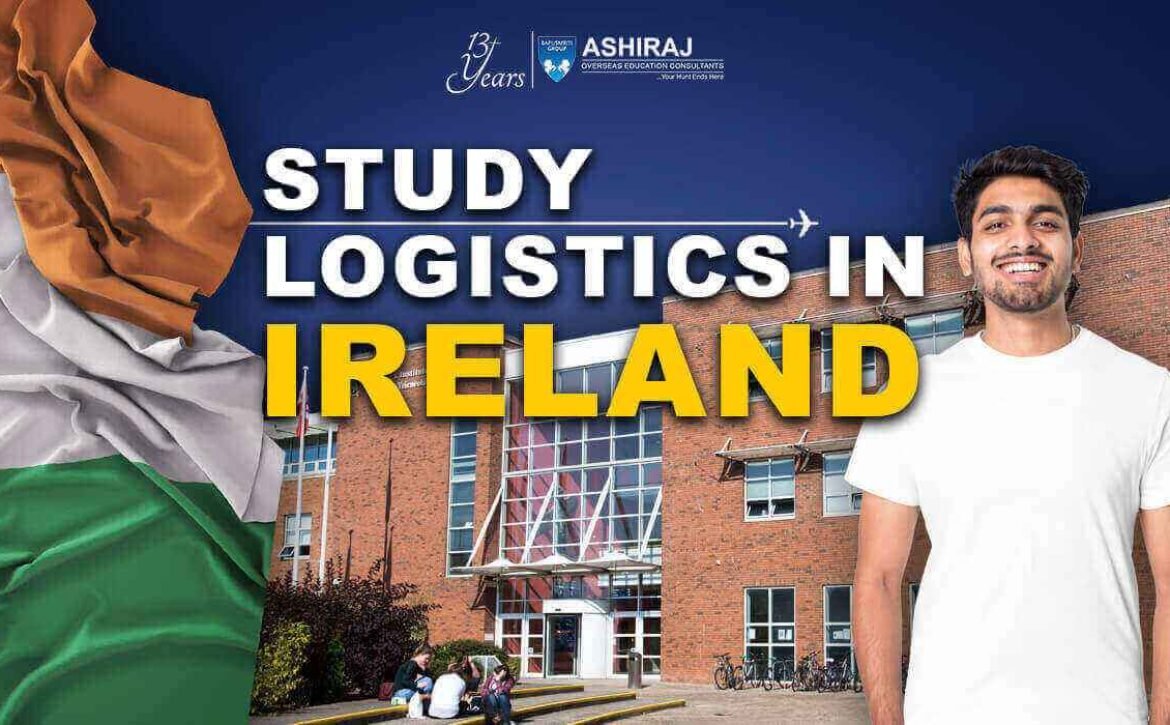
Logistics in Ireland
Logistics in Ireland plays a pivotal role in the country’s economic landscape, seamlessly connecting industries and facilitating the movement of goods across the nation. The strategic location of Ireland, nestled at the crossroads of Europe, makes it a hub for efficient transportation and distribution networks. From bustling urban centers to the serene countryside, the logistics infrastructure in Ireland is designed to meet the diverse needs of businesses, ensuring a smooth flow of products and materials. With a focus on innovation and sustainability, the logistics sector in Ireland leverages cutting-edge technologies to optimize supply chains and reduce environmental impact. As businesses continue to expand globally, Ireland’s logistics industry remains a key player in fostering economic growth and international trade.
Logistics in Ireland encompasses a comprehensive network of transportation, warehousing, and distribution services, fostering economic efficiency and competitiveness. The country’s commitment to modernizing its logistics infrastructure has positioned it as a prime destination for businesses seeking reliable and streamlined supply chain solutions. Whether by road, sea, or air, Ireland’s logistics ecosystem efficiently navigates the intricate web of connections required for the seamless movement of goods. The integration of technology-driven solutions further enhances the agility of the logistics sector, allowing businesses to respond promptly to market demands. In the heart of Europe, Logistics in Ireland is not just a facilitator of trade; it’s a dynamic force driving economic vitality and connectivity on both regional and global scales.
Why to Study Logistics in Ireland?
- Strategic Location: New Zealand’s unique geographical position in the Asia-Pacific region makes it a gateway for international trade, offering a real-world logistics learning experience.
- Global Connectivity: With a well-developed transportation network, students studying logistics in New Zealand gain insights into global supply chains, contributing to a comprehensive understanding of logistics dynamics.
- Innovative Curriculum: New Zealand’s educational institutions offer cutting-edge logistics programs, integrating technology and sustainability into the curriculum to prepare students for the future of the industry.
- Industry Collaboration: The close collaboration between academic institutions and the logistics industry in New Zealand provides students with practical exposure, internships, and potential employment opportunities.
- Quality of Life: Apart from academic excellence, New Zealand offers an exceptional quality of life, making it an attractive destination for international students pursuing logistics studies.
- Cultural Diversity: Studying logistics in New Zealand provides a multicultural environment, fostering collaboration and preparing students to navigate the diverse global business landscape.
- English Language Advantage: With English as the primary language, studying logistics in New Zealand ensures that students develop strong communication skills, a crucial aspect in the logistics profession.
- Logistics in Ireland: While New Zealand offers a unique learning experience, it’s essential to understand logistics globally. Comparatively, the logistics sector in Ireland complements New Zealand’s strengths, showcasing the diversity and interconnectedness of the logistics industry on a global scale.
Top Universities to Study Logistics in Ireland
University | QS World University Rankings 2023 | Type of University | Average Annual Fees | Programs Offered |
University College Dublin | 168 | Public | €14,000 – €35,000 | Logistics and Supply Chain Management |
Dublin City University | 429 | Public | €12,000 – €20,000 | International Business, Logistics |
University of Limerick | 511-520 | Public | €12,000 – €22,000 | Supply Chain Management, Logistics |
Cork Institute of Technology | 751-800 | Institute of Tech | €10,000 – €16,000 | Logistics and International Transport |
National University of Ireland | 601-650 | Public | €12,000 – €25,000 | Global Supply Chain Management, Logistics |
When considering studying Logistics in Ireland, it’s crucial to explore the top universities offering programs in this field. University College Dublin, ranked 168 in the QS World University Rankings 2023, is a prominent choice, providing programs like Logistics and Supply Chain Management. Dublin City University, with a ranking of 429, offers courses in International Business and Logistics. The University of Limerick, ranked between 511-520, provides programs in Supply Chain Management and Logistics. Cork Institute of Technology, ranked 751-800, specializes in Logistics and International Transport. The National University of Ireland, with a ranking between 601-650, offers Global Supply Chain Management and Logistics programs. While the fees vary, ranging from €10,000 to €35,000 annually, these universities collectively contribute to Ireland’s reputation for providing high-quality education in the field of Logistics.
Course Curriculum for Logistics in Ireland
- Comprehensive Overview: Logistics in Ireland encompasses a well-structured course curriculum designed to provide students with a comprehensive understanding of supply chain dynamics and transportation management.
- Core Modules: The curriculum typically includes core modules such as Supply Chain Management, Logistics Strategy, and International Trade, equipping students with fundamental knowledge and strategic insights.
- Technology Integration: Recognizing the importance of technology in the logistics sector, courses often incorporate modules on Logistics Information Systems, Automation, and Data Analytics, preparing students for the digital transformation in the industry.
- Industry-Relevant Projects: To bridge the gap between theory and practice, students often engage in real-world projects, collaborating with industry partners to solve logistical challenges, enhancing their problem-solving and decision-making skills.
- Sustainability Focus: Given the global emphasis on sustainability, Logistics in Ireland programs often include modules on Green Logistics and Environmental Management, preparing students to navigate eco-friendly logistics practices.
- Internship Opportunities: Many programs facilitate internships with leading logistics companies, providing students with hands-on experience and valuable industry connections.
- Global Perspective: Reflecting the interconnected nature of logistics, courses in Ireland emphasize a global perspective, covering international logistics, trade regulations, and cross-border operations.
The Logistics in Ireland course curriculum stands out for its blend of theoretical foundations, technological integration, and practical experiences, positioning graduates to excel in the dynamic and ever-evolving field of logistics.
Eligibility Criteria & Admission Requirements for Logistics in Ireland
- Academic Qualifications: Prospective students interested in pursuing Logistics in Ireland typically need a bachelor’s degree in a relevant field. Programs may have specific academic requirements, and a strong academic background enhances the application.
- IELTS or TOEFL Scores: For international students, proficiency in English is crucial. Most universities in Ireland accept IELTS or TOEFL scores as proof of English proficiency. A score above the minimum requirement is advisable for a competitive application.
- GRE or GMAT Scores: While not always mandatory, some universities may require GRE or GMAT scores for admission to Logistics programs. These scores can strengthen an applicant’s profile and demonstrate their aptitude for advanced studies.
Table: Test Score Requirements
Test | Minimum Score |
IELTS | 6.5 |
TOEFL (iBT) | 90 |
GRE | 300 (Combined) |
GMAT | 550 |
- Passport & Student Visa: International students must possess a valid passport and secure a student visa to study Logistics in Ireland. The student visa application process involves providing proof of acceptance from an Irish institution.
- Academic Certificates: Submission of academic certificates, including transcripts and diplomas, is a standard requirement. These documents verify the applicant’s educational background.
- Work Experience: While work experience is not always mandatory, some programs may consider relevant work experience in logistics or related fields as a valuable asset in the application process.
Meeting these eligibility criteria ensures a smooth application process for Logistics in Ireland, opening doors to a world-class education in the field.
Documents Required for Studying Logistics in Ireland
- Passport: A valid passport is essential for international students applying to study Logistics in Ireland. Ensure the passport has sufficient validity beyond the expected duration of your program.
- Letters of Recommendation (LOR): Typically, two Letters of Recommendation are required. These letters, preferably from academic or professional sources, provide insights into your character, achievements, and suitability for the logistics program.
- Statement of Purpose (SOP): The SOP is a personal statement outlining your motivation, goals, and reasons for choosing Logistics in Ireland. It offers an opportunity to showcase your passion and commitment to the field.
- Curriculum Vitae (CV): A detailed CV highlights your academic and professional journey, emphasizing relevant experiences, skills, and accomplishments. Tailor your CV to align with the logistics program’s requirements.
- Official High School Transcripts: Submit official transcripts from your high school, demonstrating your academic performance. Some programs may also require transcripts from any tertiary education institutions attended.
- Educational Certificates: Include copies of your educational certificates, such as diplomas or degrees, validating your academic qualifications. Ensure these documents are duly attested.
- Work Experience Certificate: If applicable, provide a work experience certificate highlighting your professional background in logistics or related fields. This adds value to your application.
- Proof of Financial Resources: To meet visa requirements, demonstrate proof of your financial ability to cover tuition fees and living expenses in Ireland. This may include bank statements, sponsor letters, or scholarship certificates.
Ensuring the meticulous compilation of these documents enhances the likelihood of a successful application for Logistics in Ireland, facilitating a seamless entry into the academic journey.
Admission Process for Logistics in Ireland
- Research Programs and Universities: Begin by researching logistics programs offered by universities in Ireland. Consider factors such as curriculum, faculty, and campus facilities. Shortlist institutions aligning with your academic and career goals in Logistics in Ireland.
- Check Eligibility Criteria: Review the admission requirements, including academic qualifications, language proficiency (IELTS or TOEFL), and any standardized test scores (GRE or GMAT). Ensure compliance with the eligibility criteria for your chosen program.
- Prepare Required Documents: Gather essential documents, including passport, letters of recommendation (LOR), statement of purpose (SOP), curriculum vitae (CV), official transcripts, educational certificates, work experience certificates, and proof of financial resources.
- Submit Online Application: Complete the online application form provided by the chosen university. Provide accurate and detailed information, attaching the required documents as specified in the application guidelines for Logistics in Ireland.
- Pay Application Fee: Pay the application fee as per the university’s instructions. Ensure timely payment to avoid delays in the processing of your application.
- Await Admission Decision: After submitting the application, patiently await the admission decision. Universities typically communicate this through email. Be prepared to respond promptly and provide any additional information if required.
- Acceptance and Visa Application: Upon receiving an offer of admission, accept the offer as per the university’s instructions. Subsequently, initiate the student visa application process, providing necessary documentation and fulfilling visa requirements.
- Arrive in Ireland: Once the visa is approved, make travel arrangements to Ireland. Attend any orientation sessions provided by the university and commence your academic journey in Logistics in Ireland.
Following these steps systematically ensures a smooth and successful admission process for those aspiring to pursue Logistics in Ireland.
“Education is the most powerful weapon which you can use to change the world.”
Nelson Mandela
Cost of Logistics Course in Ireland
- Tuition Fees: The tuition fees for Logistics programs in Ireland vary depending on the university and the level of the program. On average, international students can expect to pay between €10,000 to €35,000 per year. Research and compare tuition costs at different institutions.
- Accommodation: Accommodation costs contribute significantly to the overall expense. On-campus housing or private rentals are available options. The average monthly rent can range from €500 to €1,500, depending on the location and type of accommodation.
- Living Expenses: Estimated living expenses, including food, transportation, utilities, and miscellaneous costs, average around €700 to €1,000 per month. Budgeting for a comfortable lifestyle is essential.
- Health Insurance: International students are required to have health insurance in Ireland. The cost is approximately €500 to €1,000 per year. Ensure compliance with university health insurance policies.
- Books and Supplies: Budget for books, supplies, and other academic materials, which may amount to around €500 per academic year. Consider purchasing used books or exploring library resources.
- Miscellaneous Costs: Plan for additional expenses such as travel, social activities, and unforeseen circumstances. A buffer of €1,000 to €2,000 per year is advisable.
Considering these factors, the overall cost of studying Logistics in Ireland can range from €15,000 to €50,000 per year. It’s crucial to factor in all expenses to create a realistic budget and ensure a smooth financial journey throughout your academic pursuit in Logistics in Ireland.
Scholarships for Logistics Courses in Ireland
Scholarship Name | Eligibility Criteria | Amount | Application Deadline |
Government of Ireland Scholarship | Open to non-EEA students for master’s and PhD programs. | Full tuition, stipend | Varies (Check official website) |
Trinity College Dublin Scholarships | Merit-based scholarships for international students. | Up to €5,000 | March 31, 2023 |
University College Cork Scholarships | Available for international postgraduate students. | Up to €3,000 | May 1, 2023 |
Dublin City University Scholarships | Open to non-EU students applying for taught master’s programs. | Up to 50% tuition | June 30, 2023 |
University of Limerick Scholarships | Various scholarships for international students at UL. | Up to €4,000 | Rolling Basis |
Scholarships for Logistics in Ireland offer financial support to international students pursuing their academic goals. The Government of Ireland Scholarship provides full tuition and a stipend for master’s and PhD programs, with varied application deadlines. Trinity College Dublin offers merit-based scholarships, providing up to €5,000, with an application deadline of March 31, 2023. University College Cork provides scholarships of up to €3,000, and the deadline for application is May 1, 2023. Dublin City University offers up to 50% tuition support, and the deadline for application is June 30, 2023. The University of Limerick provides various scholarships, offering up to €4,000, with a rolling basis for applications. Prospective students should check specific eligibility criteria, amounts, and deadlines on the respective university websites for Logistics in Ireland.
Career Opportunities After Logistics in Ireland
Job Profile | Description | Average Salary (per annum) |
Logistics Manager | Oversee and coordinate supply chain operations. | €60,000 – €80,000 |
Supply Chain Analyst | Analyze and optimize supply chain processes. | €40,000 – €60,000 |
Operations Manager | Manage day-to-day logistics and operational activities. | €50,000 – €70,000 |
Transportation Planner | Plan and coordinate transportation routes and logistics. | €40,000 – €55,000 |
Warehouse Manager | Supervise and manage warehouse operations. | €45,000 – €60,000 |
Completing a Logistics program in Ireland opens up diverse career opportunities in the thriving logistics and supply chain industry. As a Logistics Manager, one can expect an average salary ranging from €60,000 to €80,000, overseeing and coordinating supply chain operations. Supply Chain Analysts play a pivotal role in optimizing processes, earning an average of €40,000 to €60,000 annually. Operations Managers, responsible for day-to-day logistics, earn an average salary of €50,000 to €70,000. Transportation Planners, coordinating routes, can expect salaries ranging from €40,000 to €55,000. Warehouse Managers, overseeing warehouse operations, earn an average of €45,000 to €60,000. These roles demonstrate the diverse and rewarding career paths available in Logistics in Ireland, providing competitive salaries and opportunities for professional growth.
Frequently Asked Questions About Logistics in Ireland
Eligibility typically includes a bachelor’s degree, language proficiency (IELTS/TOEFL), and, in some cases, standardized test scores (GRE/GMAT).
Yes, various scholarships, such as the Government of Ireland Scholarship and university-specific awards, are available to support international students.
The cost varies but generally ranges from €15,000 to €50,000 per year, covering tuition, accommodation, living expenses, and other miscellaneous costs.
The duration depends on the level of the program. Typically, master’s programs last one to two years, while PhD programs can take three to four years.
Graduates can pursue roles such as Logistics Manager, Supply Chain Analyst, Operations Manager, Transportation Planner, and Warehouse Manager, with competitive salaries.
Many programs offer internship opportunities, providing students with practical experience and industry exposure.
IELTS and TOEFL scores are commonly accepted as proof of English proficiency for Logistics programs.
Yes, international students are allowed to work part-time during the academic year and full-time during scheduled breaks.
While not always mandatory, some programs may consider relevant work experience as an asset in the admission process.
After receiving an offer of admission, apply for a student visa by providing required documents, including acceptance letter and proof of financial resources, to the Irish Naturalization and Immigration Service (INIS).




